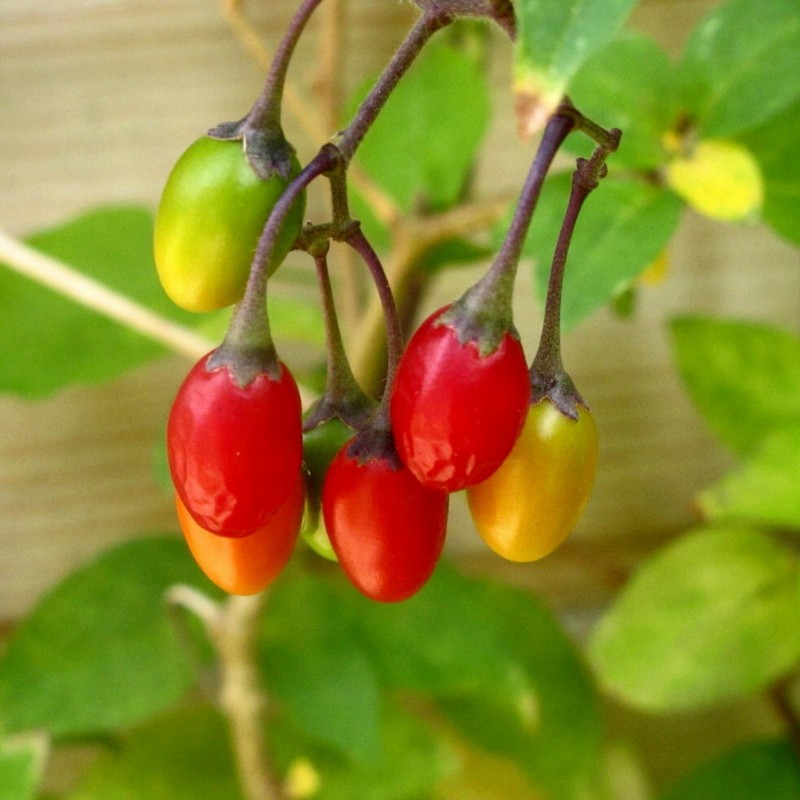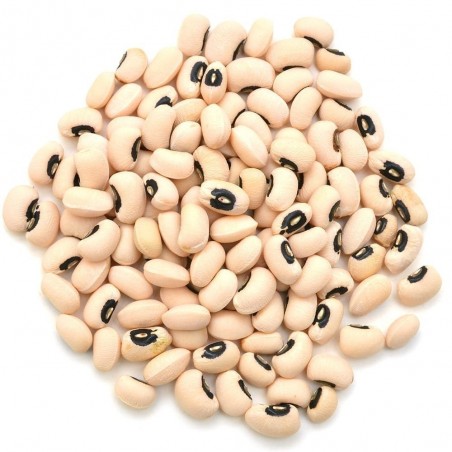
Bittersweet Seeds (Solanum dulcamara)
Bittersweet Seeds (Solanum dulcamara)
Price for Package of 5 seeds.
Solanaceae: semi-woody herbaceous perennial vine, which scrambles over other plants, capable of reaching a height of 4 m where suitable support is available, but more
Bittersweet Seeds (Solanum dulcamara)
Price for Package of 5 seeds.
Solanaceae: semi-woody herbaceous perennial vine, which scrambles over other plants, capable of reaching a height of 4 m where suitable support is available, but more often 1–2 meters high. The leaves are 4–12 cm long, roughly arrowhead-shaped, and often lobed at the base. The pretty flowers are in loose clusters of 3–20, 1–1.5 cm across, star-shaped, with five purple petals and yellow stamens and style pointing forward. The fruit is an ovoid bright red berry about 1 cm long, soft and juicy, with the aspect and odour of a tiny tomato, some reports suggest that the red berries are edible when ripe, but poisonous when green and unripe, and other literature suggests that they are deadly poisonous either red or green, I have never be tempted to find out for myself. Native to Britain, northern Africa, Europe and Asia.
Bittersweet is a poisonous plant that has a long history of use in the treatment of skin diseases, warts, tumours, felons etc., all parts of the plant are alterative, anodyne, depurative, mildly diuretic, emetic, expectorant, hepatic, mildly narcotic and purgative. it should be used with caution and only under the supervision of a qualified practitioner, this is a poisonous plant that, in excess, paralyzes the central nervous system, slows the heart and respiration, and lowers temperature, causing vertigo, delirium, convulsions and death.
Sow seeds in spring, a soak in Ga3 will help, when they are large enough to handle, prick the seedlings out into individual pots and plant them out into their permanent positions in the summer. If you have sufficient seed then it can be sown outdoors in situ in the spring.
WARNING: There is a lot of disagreement over whether or not the leaves or fruit of this plant are poisonous. Views vary from relatively poisonous to perfectly safe to eat. The plant is cultivated as a food crop, both for its fruit and its leaves, in some parts of the world and it is probably true to say that toxicity can vary considerably according to where the plant is grown and the cultivar that is being grown. The unripe fruit contains the highest concentration of toxins.
Sowing Instructions | |
| Propagation: | |
| Pretreat: | 0 |
| Stratification: | 0 |
| Sowing Time: | all year round |
| Sowing Depth: | Just lightly cover with substrate |
| Sowing Mix: | Coir or sowing mix + sand or perlite |
| Germination temperature: | min. 20 ° C |
| Location: | bright + keep constantly moist not wet |
| Germination Time: | until it germinates |
| Watering: | Water regularly during the growing season |
|
|
|


Your review appreciation cannot be sent
Report comment
Report sent
Your report cannot be sent
Írd meg véleményedet
Review sent
Your review cannot be sent
🌍 Globális szállítás az EU-ból
Világszerte szállítunk az Európai Unióból ajánlott küldeményként, átvételi visszaigazolással.
📦 Csomagkövetés
A csomagod követéséhez jelentkezz be a fiókodba, majd menj a Rendeléstörténet > Részletek menüpontra, ahol megtalálod a követési számot.
Nemzetközi követés: 17Track
RGxxxxxxHR típusú számok esetén: Posta.hr követés
🕒 Kérjük, várj legalább 24 órát a feladás után, hogy a követési adatok elérhetővé váljanak.
⚠️ Fontos tudnivalók
Utánvét nem elérhető.
Rendszeresen ellenőrizd a spam vagy kéretlen mappát az e-mail fiókodban az értesítésekért.
Kérjük, kizárólag a weboldalunkon található kapcsolati űrlapot használd.
Közvetlen e-mailekre nem biztos, hogy válaszolunk.
📱 Telefonszám megadása kötelező
Rendeléskor kötelező megadni a mobiltelefonszámodat az országkóddal együtt.
Példa: +36 30 123 4567
🚚 Szállítási feltételek
A nyomon követett csomag átvételekor átvételi aláírás szükséges.
Ne rendelj, ha:
postafiókba szeretnéd a csomagot
nem leszel otthon a kézbesítéskor
a csomagot a szomszédnak szeretnéd átadni (❌ ez nem lehetséges)
📬 Ha postafiók címet adsz meg, és a csomag elveszik, nem jár visszatérítés.
↩️ Csomag visszaküldése és újraküldés
Ha bármilyen okból visszaküldik a csomagot:
Visszaküldési díjat kell fizetned: 2 €
Valamint az újraküldés költségét is
⏱ Késések és nyomon követés
Ha a csomag még mindig a feladónál szerepel a követésben, az azt jelenti, hogy úton van.
A legfrissebb információkért keresd meg a helyi postahivatalt a követési számmal.
Nem vagyunk postaszolgáltató, így a csomagot nem tudjuk helyetted követni.
Nem vállalunk felelősséget a szállítás időtartamáért.
🔍 Eltűnt csomag ügyében vizsgálatot csak 30 nappal a feladás után indíthatunk.
✈️ Szállítási opciók
| Szállítás típusa | Feldolgozási idő | Biztosítás | Lehetséges késések | Megjegyzés |
|---|---|---|---|---|
| Standard | 7–10 munkanap | ❌ | 7–14 munkanap | Legolcsóbb opció |
| Prioritás | 1–7 munkanap | ❌ | 3–10 munkanap | Prioritásos feldolgozás – nem feltétlenül gyorsabb szállítás |
| Biztosított | 1–7 munkanap | ✅ | 3–10 munkanap | Visszatérítés elvesztés esetén (max. 150 € értékig) |
🕒 Várható szállítási idő:
Európai Unión belül: 3–20 munkanap
Világszerte: 5–30 munkanap
USA példák: 27, 22, 19, 17, 13 nap
💳 Fizetési módok
💶 Banki átutalás (SEPA / IBAN / SWIFT-BIC)
A fizetés leírásában kötelező megadni a rendelési számot (pl. SGS-19811702).
Ha hiányzik ez az adat, késedelmet vagy rendelés törlést okozhat.
Ha a befizetés nem érkezik meg 7 napon belül, a rendelést automatikusan töröljük.
🅿️ PayPal
Csak euróban történő fizetést fogadunk el PayPal-on keresztül.
Kérjük, a fizetéskor válaszd az eurót mint pénznemet.
💳 Bankkártyás fizetés
Kártyás fizetés a weboldalunkon keresztül: Exotic Seeds Store
Elfogadott kártyák: Visa, MasterCard, American Express, Diners Club, UnionPay, JCB, Discover stb.
💡 A vásárló viseli az esetleges tranzakciós díjakat.
Kérjük, küldd el a fizetés igazolását a gyorsabb feldolgozás érdekében.
📅 Egyéb információk
Hétvégén (szombat, vasárnap) nem dolgozunk fel rendeléseket és nem szállítunk.
Mindig olvasd el a fontos közleményeket a weboldalunkon (ünnepnapok, speciális feltételek stb.).
📫 Fontos:
Ne küldj közvetlen e-mailt nekünk. Csak a weboldalunkon lévő kapcsolati űrlapot használd.
Related Products

















